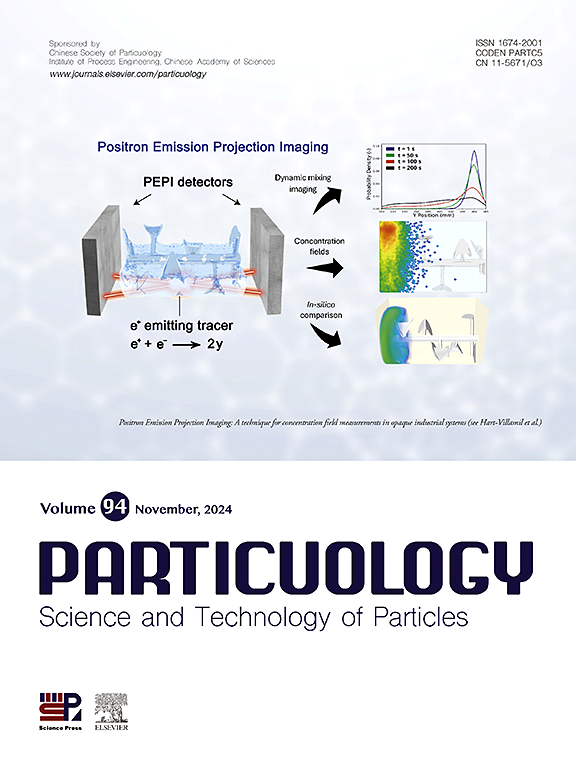Preparation of colon-targeted alginate microspheres loaded with the honokiol-doxorubicin conjugate and their therapeutic effect on colon cancer
IF 4.1
2区 材料科学
Q2 ENGINEERING, CHEMICAL
引用次数: 0
Abstract
Combining drug delivery technologies with chemotherapeutic drugs is very attractive in terms of enhancing antitumor efficacy and reducing toxicity. Alginate microspheres stand out in the field of drug delivery due to their biocompatibility and high conversion rate. However, there are certain drawbacks in their preparation technology and further research is needed on how to prepare alginate microspheres with uniform particle size using high-viscosity sodium alginate solution. Therefore, this study proposed a novel microfluidic membrane emulsification technique for the preparation of alginate microspheres from high-viscosity sodium alginate solution. A tumor microenvironment-responsive colorectal cancer-targeted oral drug delivery system was constructed using a disulfide-bonded coupling of honokiol and doxorubicin as a model drug to achieve precise targeting, efficiency enhancement and toxicity reduction. The results showed that the prepared microspheres were relatively homogeneous in particle size. The in vitro model showed the high stability of the microspheres in the gastric acid environment and the colon-targeted release characteristic. And the system triggered the breakage of redox bonds and the precise release of the drug, showing good antitumor activity. This study contributes to the construction of drug delivery systems and the study of colon cancer treatment, which has a promising application.

载厚朴酚-阿霉素偶联物结肠靶向藻酸盐微球的制备及其对结肠癌的治疗作用
将给药技术与化疗药物相结合在提高抗肿瘤疗效和降低毒性方面具有很大的吸引力。藻酸盐微球以其生物相容性和高转化率在给药领域脱颖而出。但其制备工艺存在一定的缺陷,如何利用高粘度海藻酸钠溶液制备粒径均匀的海藻酸微球还有待进一步研究。为此,本研究提出了一种以高粘度海藻酸钠溶液为原料制备海藻酸微球的新型微流控膜乳化技术。以红木酚与阿霉素二硫键偶联为模型药物,构建肿瘤微环境响应型结直肠癌靶向口服给药系统,实现精准靶向、增效降毒。结果表明,所制备的微球粒径相对均匀。体外模型显示微球在胃酸环境中具有较高的稳定性和结肠靶向释放特性。该系统触发了氧化还原键的断裂和药物的精确释放,显示出良好的抗肿瘤活性。该研究有助于构建药物传递系统和结肠癌治疗研究,具有广阔的应用前景。
本文章由计算机程序翻译,如有差异,请以英文原文为准。
求助全文
约1分钟内获得全文
求助全文
来源期刊

Particuology
工程技术-材料科学:综合
CiteScore
6.70
自引率
2.90%
发文量
1730
审稿时长
32 days
期刊介绍:
The word ‘particuology’ was coined to parallel the discipline for the science and technology of particles.
Particuology is an interdisciplinary journal that publishes frontier research articles and critical reviews on the discovery, formulation and engineering of particulate materials, processes and systems. It especially welcomes contributions utilising advanced theoretical, modelling and measurement methods to enable the discovery and creation of new particulate materials, and the manufacturing of functional particulate-based products, such as sensors.
Papers are handled by Thematic Editors who oversee contributions from specific subject fields. These fields are classified into: Particle Synthesis and Modification; Particle Characterization and Measurement; Granular Systems and Bulk Solids Technology; Fluidization and Particle-Fluid Systems; Aerosols; and Applications of Particle Technology.
Key topics concerning the creation and processing of particulates include:
-Modelling and simulation of particle formation, collective behaviour of particles and systems for particle production over a broad spectrum of length scales
-Mining of experimental data for particle synthesis and surface properties to facilitate the creation of new materials and processes
-Particle design and preparation including controlled response and sensing functionalities in formation, delivery systems and biological systems, etc.
-Experimental and computational methods for visualization and analysis of particulate system.
These topics are broadly relevant to the production of materials, pharmaceuticals and food, and to the conversion of energy resources to fuels and protection of the environment.
 求助内容:
求助内容: 应助结果提醒方式:
应助结果提醒方式:


